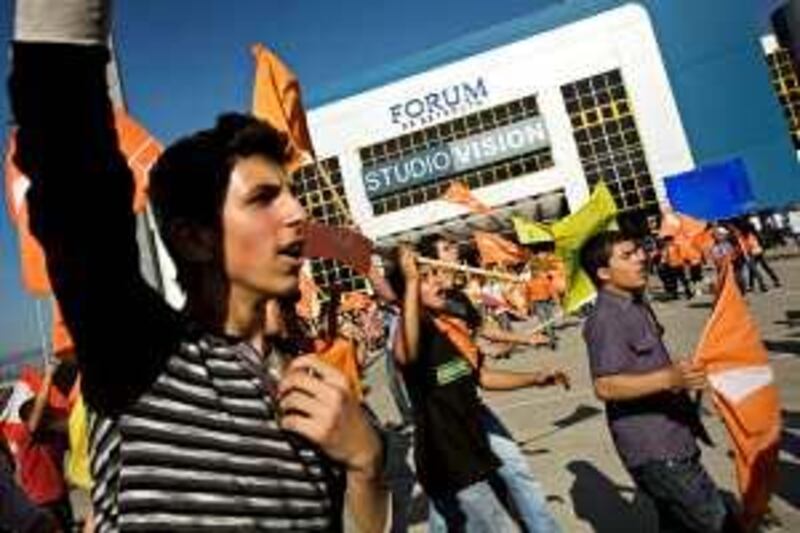BEIRUT // An hour before Michel Aoun, a former general and one of Lebanon's most popular Christian leaders, was due to speak on Saturday night, his political advance team realised it had a crowd control problem. Mr Aoun's mostly upper-class party, the Free Patriotic Movement, bused in dozens of Shiite youths from Lebanon's impoverished southern suburbs including Dahiya, but now found the cultural differences hard to handle. The teenagers began a chant that threatened to upset Mr Aoun's traditional base.
The scene stands as a metaphor for his campaign's balancing act as it enters the last week before parliamentary elections on Sunday. In Lebanon's notoriously sectarian political scene, few alliances have raised tensions or eyebrows more than the one between Mr Aoun and the Shiite community. Almost three years ago, Mr Aoun, a dedicated foe of the Syrian occupation of Lebanon, joined political forces with Syria's staunchest Lebanese allies, the radical Shiite movement Hizbollah and its more secular allies, the Amal Movement.
Many in Lebanon's Christian community immediately criticised this unlikely alliance between ideological and religious polar opposites. While Mr Aoun's popularity appears to have dropped among followers made uncomfortable by his teaming with a religious movement that once called for an Islamic state in Lebanon, he remains a powerful force who has given the opposition a credible chance of winning the elections.
Composed mostly of independent-minded Maronite Christians, Mr Aoun's Free Patriotic Movement (FPM) typically avoids the sectarian campaign tactics that are all too common in Lebanese politics. But a partnership between a mostly affluent and Christian party built around discarding Lebanon's old religious prejudices and the primarily working-class, religious and culturally insular mainstream Shiite parties poses critical political challenges on the campaign trail.
Despite demographic changes that have turned Lebanon's Christians from a powerful majority to a minority swing vote in just a few generations, many in Lebanon's Maronite community continue to see themselves as the ruling force in Lebanon, deeply uncomfortable with a rising Muslim population and a politically emboldened Hizbollah. Pre-election polling and even population estimates in Lebanon remain inaccurate, in part because the country has not held a formal census in more than 50 years. But it is clear that the once-powerful Christian community now makes up, at most, about one-third of Lebanon's estimated four million people.
With an election list system deeply tilted towards protecting incumbents and Sunni and Shiite political machines that will probably deliver their votes to the government and opposition respectively, Lebanon's divided Christians appear to control the swing vote. What remains unknown is how Mr Aoun, who easily won the Christian vote in 2005, will fare now that he is aligned with Hizbollah and Amal. In the campaign rally, before a crowded room at the upscale Forum de Beirut shopping centre in al-Metn, a Christian suburb of Beirut, it became clear that balancing his message of nonsectarian governance and battling corruption is often overshadowed by his partnership with a Shiite community that has perhaps the worst relationship with the Christians of any group in Lebanon. Managing the perception that he is aligned with a pro-Syrian, conservative Muslim community dedicated to armed resistance to Israel and the West remains a tricky balancing act of not just religious and political values but also of economic class and culture.
Dozens of teenage boys waved Hizbollah flags and chanted "Allah, Nasrallah, and all of Dahiya" about an hour before Mr Aoun was due to take the stage. An organiser from the FPM immediately saw the sectarian nature of the chanting and politically problematic images that might upset Christian swing voters in the election's most critical district. But getting rid of the youths posed no easy problem. As they were hustled off the floor, an Aoun official confronted the teenagers in the car park as they continued chanting Hizbollah-themed slogans.
"You are acting in a terrible way. You must stop these slogans; you can't chant about being Shiite here," the frustrated official, who would not give his name, said to the group of teenagers. When he stopped yelling at them, the crowd once again began chanting: "We are all Shiite, We are the Shiite." Now visibly annoyed, the official tried to force them further from the venue before the media noticed them.
"Just leave, go back to Dahiya; we don't want you here," the man shouted. "Nasrallah, Nasrallah! No fear, No fear. All of Dahiya will turn into a Kalashnikov!" responded the group, pushing the rhetoric into even more dangerous territory. "Back on the buses," Aoun officials shouted. "We don't need you here. They need you back in Dahiya!" As the teenagers were hustled onto the buses - charted by Amal and Hizbollah to bring supporters to Mr Aoun's rally - one young man holding a Hizbollah flag in one hand and a drum in the other, denied there was a problem with the Aounists.
"We are leaving because Sayid Hassan [Nasrallah, leader of Hizbollah] is speaking tonight and they need us in Dahiya to get ready for it," he sheepishly claimed before refusing to give his name and scampering away. After packing them back on to their buses for a return trip to the Shiite section of town, the visibly relived organisers then returned to the rally, where about 500 people waved the orange flags of the FPM and waited for the general to speak. Only a handful of Hizbollah flags could be seen in the back of the room, waved by dignified older women in headscarves.
mprothero@thenational.ae





